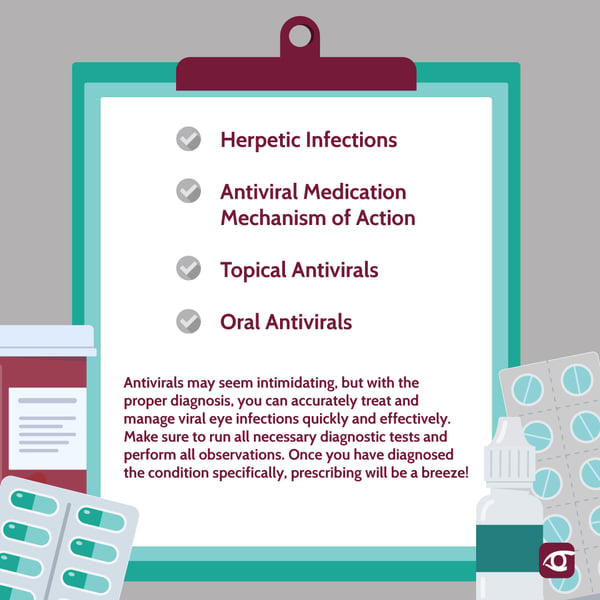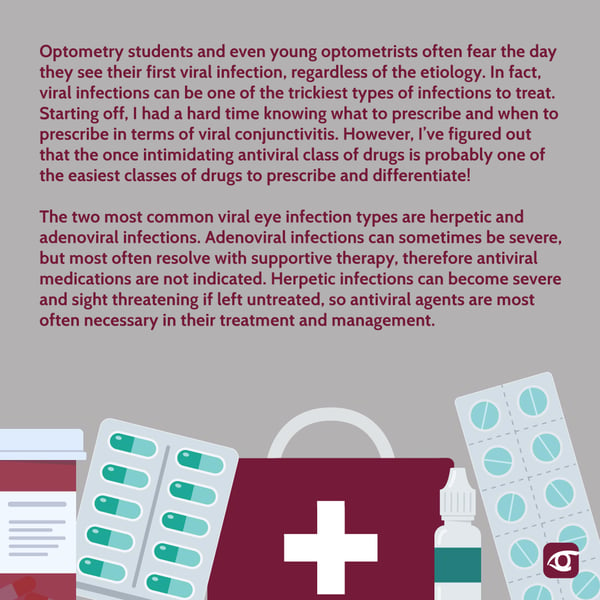
Optometry students and even young optometrists often fear the day they see their first viral infection, regardless of the etiology. In fact, viral infections can be one of the trickiest types of infections to treat. Starting off, I had a hard time knowing what to prescribe and when to prescribe in terms of viral conjunctivitis.
However, I’ve figured out that the once intimidating antiviral class of drugs is probably one of the easiest classes of drugs to prescribe and differentiate!
The two most common viral eye infection types are herpetic and adenoviral infections. Adenoviral infections can sometimes be severe, but most often resolve with supportive therapy, therefore antiviral medications are not indicated. Herpetic infections can become severe and sight threatening if left untreated, so antiviral agents are most often necessary in their treatment and management.
Today I’ll go over some clinical pearls and review ophthalmic antivirals that are used for one of the main categories of viral infections in the eye.

Herpetic Infections
The herpes family of viruses affect the DNA of humans. Upon infection, DNA replication begins when the virion binds to the plasma membrane of the host cell, causing fusion of the envelope with the cellular envelope of the host cell. The capsid and tegument are then transported to the nucleus where viral DNA is released and transcription follows as usual. The genus of the herpes family that are responsible for ocular manifestations are Simplexvirus & Varicellovirus.
The genus Simplexvirus contains two common viruses that affect the eye: Herpes Simplex 1 (HSV1) and Herpes Simplex 2 (HSV2). Upon infection, these can cause sores, ulcerations, conjunctivitis, and keratitis. The genus Varicellovirus contains Varicella Zoster (VSZ) commonly known as chickenpox and shingles. VSZ can also cause sores and inflammation around and on the surface of the eye. Both can cause epithelial defects of varying intensity on the cornea.
Antiviral Medication Mechanism of Action
Viruses cannot reproduce by themselves. Therefore, they attack and “hijack” the host cell. The herpes family of viruses are DNA viruses, and therefore rely on DNA polymerase, which catalyzes the synthesis of DNA within the cell. Therefore, the antiviral agents we will be discussing are classified as DNA polymerase inhibitors.
Topical Antivirals
Topical therapy is recommended in the case of HSV keratitis and Herpes Zoster Ophthalmicus. Both topical antiviral medications below are DNA polymerase inhibitors.
Trifluridine (Viroptic®): Dosed 9x/day in active HSV keratitis. Epithelial toxicity has been noted with Viroptic® due to the presence of thimerosal. Viroptic® burns upon instillation.
Ganciclovir (Zirgan®): Dosed 5x/day in active HSV keratitis. Note that Zirgan® is preserved with BAK (benzalkonium chloride), allowing reduced discomfort and epithelial toxicity compared to Viroptic®.
Oral Antivirals
Oral antivirals are typically used for systemic herpetic manifestations but can be used to treat ocular signs as well. These drugs are active against HSV1, HSV2, Shingles, and Herpes Zoster Ophthalmicus. A patient with a history of herpes can be on long term treatment and already started on one of these oral medications by their primary care physician. Please note that oral antivirals can be an effective treatment method for HSV keratitis but have not been FDA approved for this condition specifically. Their use in the treatment of HSV keratitis is off-label. In the case of Herpes Zoster Ophthalmicus, treatment should be initiated less than 72 hours after onset of symptoms. Below are the recommended dosing patterns for oral antivirals for the treatment of Herpes Zoster Ophthalmicus.
- Acyclovir (Zovirax®): 800 mg five times daily for seven days
- Valacyclovir (Valtrex®): 1000 mg three times daily for seven days
- Famciclovir (Famvir®): 500 mg three times daily for seven days
Antivirals may seem intimidating, but with the proper diagnosis, you can accurately treat and manage viral eye infections quickly and effectively. Make sure to run all necessary diagnostic tests and perform all observations. Once you have diagnosed the condition specifically, prescribing will be a breeze!

- Dr. Amadian
